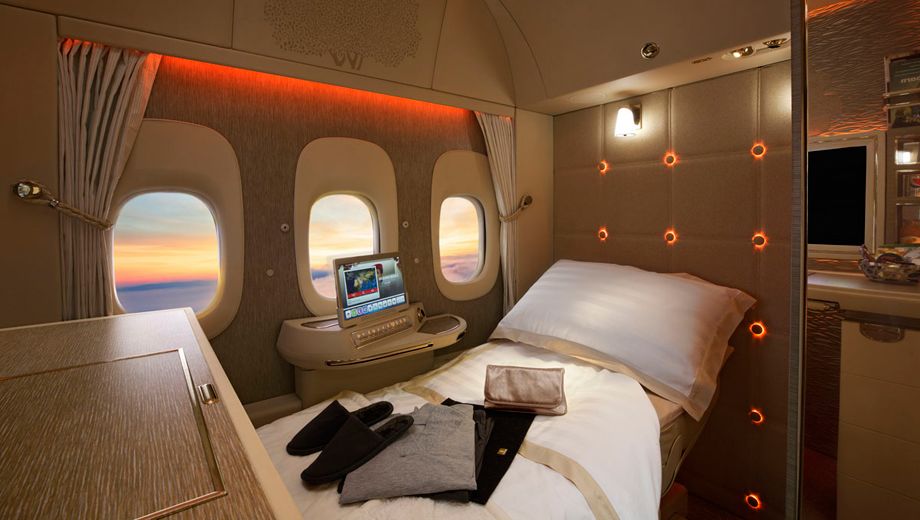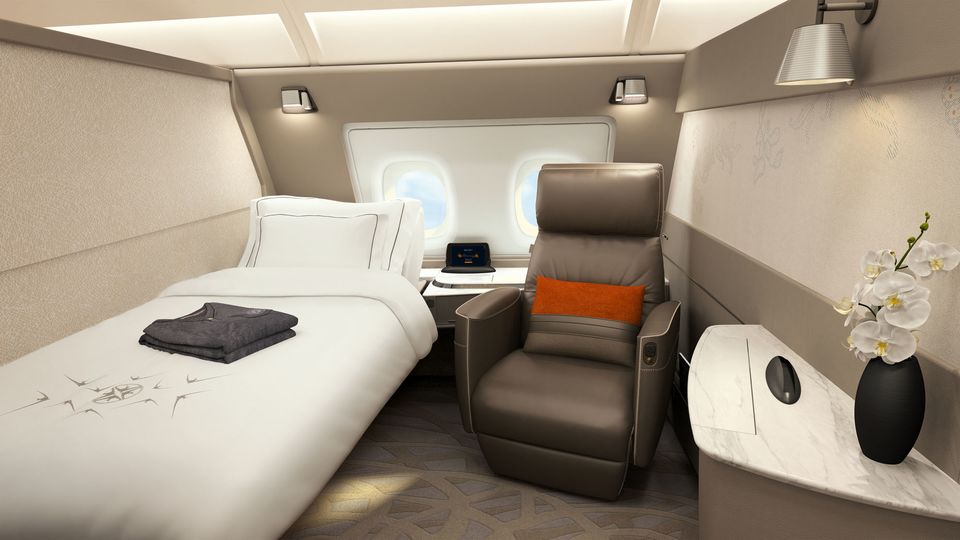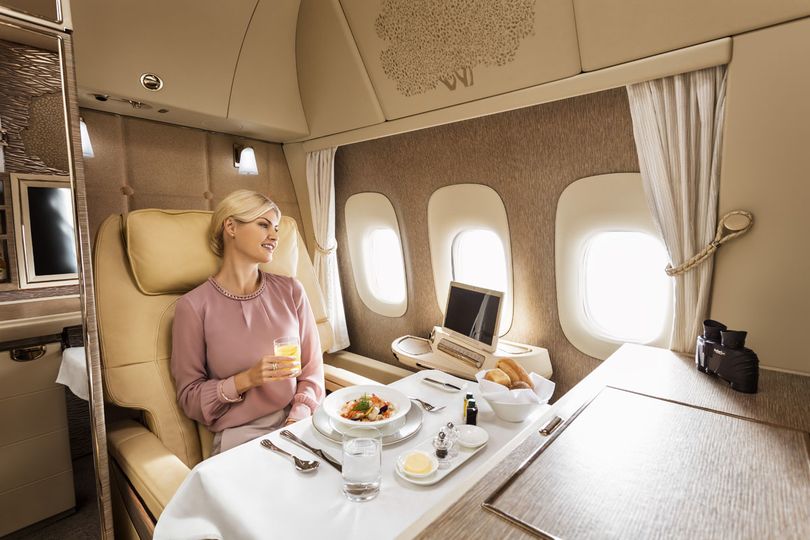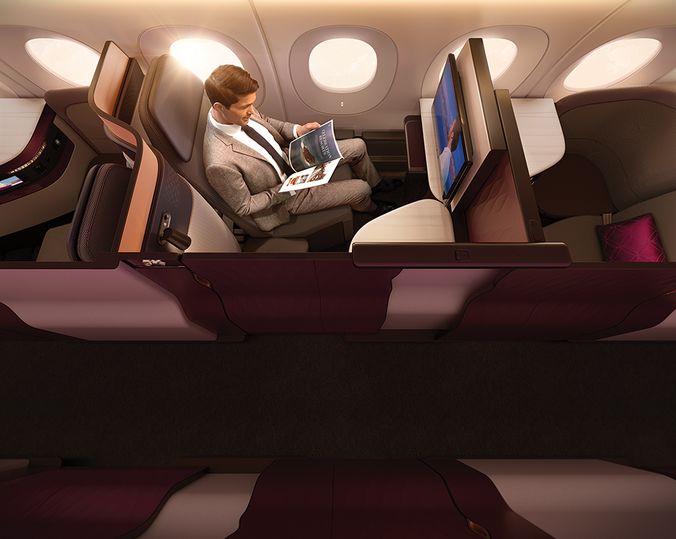Why first class is more lavish, less viable than ever

At the beginning of November, Singapore Airlines announced the world's most luxurious first-class seat.
Passengers can expect the best: bedding (for two, if desired) embroidered by Lalique, dinner served on Wedgewood, a 32-inch HD screen, two bathrooms and a full-sized wardrobe.
Just ten days later, Emirates sought to outdo the Southeast Asian giant with its own first-class suite featuring hardwood floors, mood lighting, kelp-infused moisturizing pajamas and design details inspired by the Mercedes-Benz S-Class.
The high-end one-upmanship would appear to herald a new golden age of luxury air travel, at least for those able to afford tickets that cost in excess of US$10,000 per passenger.
In fact, first-class cabins have been shrinking for two decades at least, under pressure from an increasingly competitive, price-focused global airline industry and the changing demographics of flying.
Those trends are only set to accelerate. The latest luxury suites may look futuristic, but it's not clear that first class has a future at all.
The evolution of first class
The very idea of first-class harkens back more than half a century to the so-called Golden Age of Air Travel, when passenger seating overall was less cramped, food was (allegedly) better, sleeper berths were common and sweatpants weren't acceptable attire for travel.
Multi-class cabins, first introduced in the 1950s, put a price on that "golden" experience. The launch of the Boeing 747 in 1969 introduced an even more lavish world for high flyers that included bars and lounges, world-class cuisine and fat sleeper seats.
Airline deregulation in the late 1970s and early 1980s began changing the financial equation. By the mid-1980s, caught up in brutal price wars, U.S. carriers were struggling to keep offering first-class levels of service at reduced prices.
One solution: leave first-class seats empty or give them away for free as upgrades to valued customers. As recently as 2011, only 14 percent of Delta Air Lines' first-class seats were paid for; the rest flew empty or with upgraded passengers. From a business standpoint, that's not a terribly good use of a plane's valuable real estate.
Business class takes hold
The solution, devised in the mid-1970s, was business class. As first deployed, it offered full-fare-paying customers a slightly higher level of service than those who were on discounted tickets. Eventually, as business class grew more luxurious, it began to cannibalize first class.
That's only going to continue. For lower but still expensive fares, business travelers can now enjoy amenities that would've been considered first-class a few years ago, including lie-flat beds, better food and – increasingly – a door and privacy.
More important, it's possible to stuff more business class seats than first-class seats into the same amount of space, making business class a winner for the airlines, too.
Despite the hype around its new first-class suite, even Singapore Airlines is reducing the number of suites in its fleet by 50 percent, while boosting the number of business-class seats by 10 percent and – on 11 planes – by 30 percent.
Likewise, even as Emirates touts its own hyper-luxury suites, it only plans to offer six of them on barely nine planes by the end of 2019 – less than 4 percent of its fleet.
For a better idea of how Emirates sees its future, look no further than the record-setting 615-seat Airbus A380 it started flying in 2015. Those planes won't offer first class at all.
The fate of first class
Among the big three U.S. carriers, Delta has phased out international first class altogether, United is ending it in 2018 and American offers it on only a small handful of flights.
Elsewhere in the world, airlines including Cathay Pacific, Lufthansa and Qantas are reducing the number of first-class seats and the routes on which they're available.
As global aviation becomes more competitive, and greater numbers of passengers in developing regions take their first flights, the pressure to keep prices down will only increase.
Celebrities and recluses willing to fork out thousands of dollars for a private suite will probably always have a first-class option on flights between global financial centers. But most people will likely be content with business class – or have the money for a private jet.
Airlines will use those few first-class suites largely as marketing opportunities to buff their brand, even as they pack more and more seats into their planes. For most of the world, the only class will matter in the future is cattle class.



24 Aug 2011
Total posts 1209
Business class today is so far ahead of what First Class was 20 years ago, it is not even comparable. 20 years ago, First Class was basically a big recliner with lots of legroom. This evolution has meant, not only that First Class is virtually forbidden for all staff, Business Class is often seen as excessive these days hence the rise of Premium Economy which is basically the same product as the original Business Class created by Qantas back in the early 80's.
20 May 2015
Total posts 581
First Class is occupying a smaller market space than before, I agree. Its a huge investment for an airline too... ground service is a massive component of First and this isn't cheap to provide!
26 Jul 2015
Total posts 75
I would be greatly saddened to see 1st class go. Whilst business is good and getting better all the time, for me, the comfort of it just doesn't quite make it. There is always a compromise in the offering and more often than not, its the one that makes my journey not as comfortable as I would like it to be. So, whilst its still there and I can afford to pay for the ticket, I'll stay with 1st.
Emirates Airlines - Skywards
11 Mar 2015
Total posts 191
it's still worth to look and compare the two side by side-how can u compare emirates with SQ first class??QF is not even an even playing field with their product-unfortunately just missed 1 day the new SQ first class inaugural flight but still good the old one for a return Europe extravaganza-how can u beat their food on board/??
31 Aug 2012
Total posts 7
Even though I never fly in first, I hope it stays around because I'm concerned that if business becomes the top class of travel available it will push corporate travel policy towards premium economy. At the moment there still remains (albeit tenously) a justification that travellers are saving the company some money by foregoing first and taking business.
Qantas - Qantas Frequent Flyer
14 Sep 2012
Total posts 381
I would say if you really have a real market for F either in $ or FFP then keep it and do it really well (aka EK, EY, SQ). If you’re behind these guys right now (and most carriers are) it’s going to be hard to catch up, I’d say drop it and do a really great J class and great PY (that’s where I’d put QF).
Emirates Airlines - Skywards
05 Jun 2017
Total posts 28
Personally, I would mourn the passing of first class. The level of service and comfort is not met by the business offering. It is the major reason why i choose to remain exclusively with Emirates. If they ditch FC, I ditch them. No question
Emirates Airlines - Skywards
05 Jun 2017
Total posts 28
I just hope i will have somewhere else to go!!!!
Air New Zealand - Airpoints
21 Jan 2016
Total posts 193
As long as the B748i and the A380 are still in production and flying, there will be still 1st Class product available from those carriers who have or who will want to spend the money in offering a '1st Class' product.
As air travel become more twin engine aircraft orientated, most carriers who want to offer premium cabin product will offer Business Class with lay flat bed seats and premium economy cabins, as carriers can make more $$$ from a wider range of passengers, with the high investment of 1st Class for a very small market segment.
From my perspective, 1st Class is an enhance version of Business Class. As long I have a lay flat bed seat, good personal space and the price is right for a an over night or day time flight 5 hours or more I am happy. Premium economy is fine with me for flights under 5 hours.
Qf
26 Apr 2015
Total posts 21
It is a natural progression - too many carriers were offering too many seats in F. Now with reduced capacity it will be more viable. You will get carriers like Qantas with J+ where it will be a carrot for FF to buy awards and upgrades and you will have the true F from a few carriers. I am happy to pay for F (and am neither a rockstar nor a recluse), because I enjoy the extra luxury and service and I only travel once a year so why not. Qantas increasingly annoyed me as I felt it was not value for money, but EK and SQ are and the new F definitely is.
03 Oct 2011
Total posts 34
The article makes some excellent points, but has a few flaws. Most glaringly, Qantas may be reducing flights with F, but has a woefully uncompetitive business class offering, with last-century style paired seats (the dreaded "climb-over-or-be-climbed-over").
Hi Guest, join in the discussion on Why first class is more lavish, less viable than ever